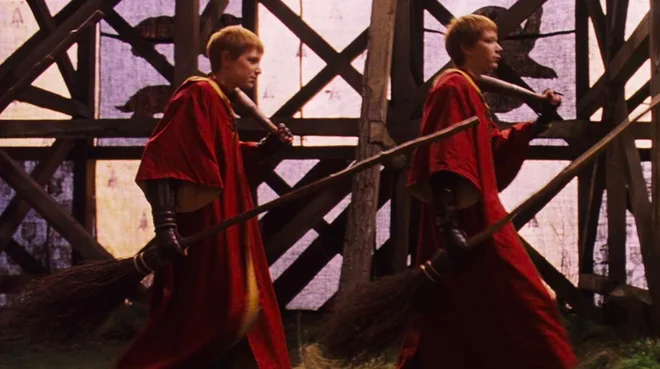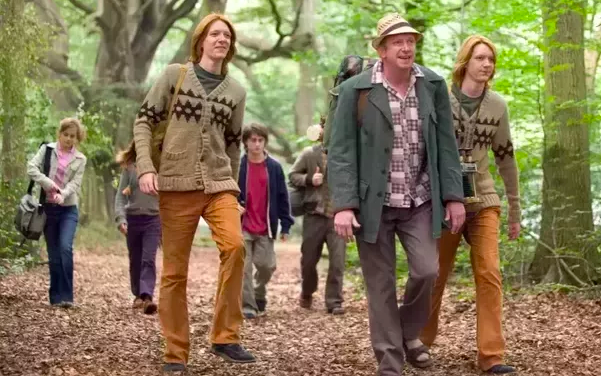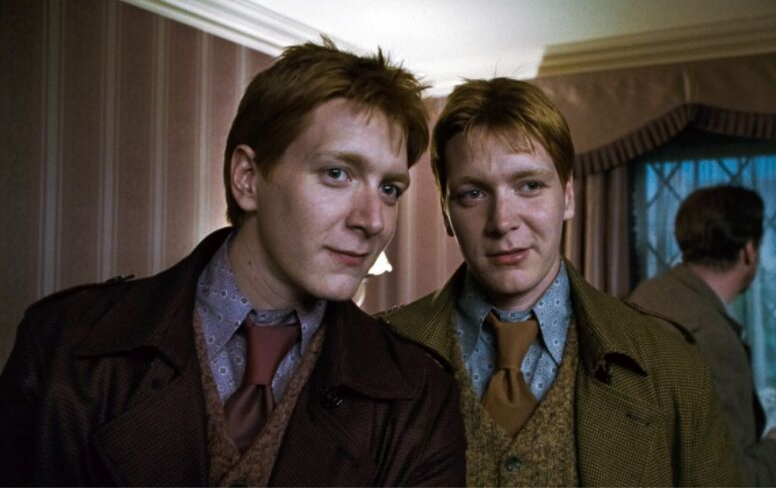The Weasley Twins and Their Lasting Impact on the Harry Potter Series
August 14, 2019—Ah, the Weasley twins – pranksters and inventors extraordinaire! I simply couldn’t let this episode on magical theory and inventions in the Wizarding World go by without taking a closer look into the rather large role that these two play in the Harry Potter series. While not the first characters that may come to mind when one thinks back on the storyline, Fred and George were there for most all of the big moments. From helping Harry onto Platform 9¾ his first year of school to the final battle with Voldemort, these two are a large part of Harry’s journey, and I couldn’t imagine it without them.
Before jumping into a more detailed examination of some of the main values that these two add to the series, let’s look at the differences between them (because yes, there are differences!).
Similar, Yet Not the Same
While typically seen as more of a unit in the series, Fred and George do have some major personality differences, though they are a bit difficult to catch on to at first.
Fred Weasley is the front-man of the duo—always there with a joke or snappy comment to get people’s attention. This is seen in the books, as he has 200 more mentions than George (as confirmed by Pottermore), even though George can typically be found in proximity during those instances. Fred is also the instigator of the two, even on the smaller pranks. He’s the one who “accidentally” dropped a Ton-Tongue Toffee at Dudley Dursley’s feet and had the idea to use an Ageing Potion to try and trick the Goblet of Fire.
He also was the harsher one when it came to criticisms given in the form of jokes or imitations. These were mostly to and about his family, specifically Ron and Percy when the two of them were acting in a way the twins didn’t agree with or were annoyed by.
George Weasley, while a bit more level-headed than his brother, was still extremely charismatic and often served as the diplomat between the rest of the world and Fred, explaining what his brother had actually meant in certain circumstances or subtly smoothing over any damage they had caused with the people they cared about. This isn’t to say that he didn’t join in and enjoy the mischief, but typically he took his cues from Fred about what types of jokes they would be making.
While Harry was close with both of the twins, he had longer conversations with George. In these, George took the time to explain things Harry may have missed or not understood and to detail the twins’ future plans. George is also shown to be the more compassionate one. While Fred may take a joke too far, like when he kept teasing Ron over Scabbers’s presumed death, George tried to cheer Ron up, reminding him that he had been complaining about the rat anyway.
Off the Quidditch pitch, George may have been the more compassionate twin, but on the pitch all bets were off! He made a very good Beater as his aim was impeccable, and he tended to view hitting a Bludger as a way of “vent[ing] his feelings.”

Now that we’ve identified some key differences between these two, let’s take a look at a couple of the main values these two add to the Harry Potter series:
The Importance of Finding Joy
The first thing to note about the twins is that bringing joy and lightening the mood are their coping mechanisms during chaotic or serious situations. From the first time that we see them in Harry Potter and the Philosopher’s Stone, they purposefully tease their mom a little bit, both to help get her mind off of her stress at transporting 5 (6 with Harry) children and their belongings onto the train on time and to alleviate Ron’s and Harry’s nervousness about getting onto the platform. “This is a way for the twins to break off some of the tension all around them and provide people with a sense of ease and comfort, an idea that everything will be fine eventually. In addition, they provide a distraction for all from their current state of worry.”1
This is a major theme for these characters and is one we see continually repeated throughout the series. I think it’s important to note, though, that finding joy or humor took effort on their part, especially as they got closer to the final battle. It was a choice for Fred to get involved with Potterwatch during the war to help bring a bit of light to the darkness, and it was a choice for them both to help Harry see the happier sides of life during his teenage angst phase.
Passions Can Become Successful Professions
While the idea has not been 100% confirmed by any official source, I’ve always imagined these two being naturally inclined towards mischief at a very young age, being taught and encouraged in their pranks by the oldest two Weasley boys, and then being “set loose” to wreak havoc on the others. Once they discovered that they could receive attention from their family this way (whether that be good or bad attention), I imagine that was a natural encouragement to continue and get better.
Arthur Weasley provides an interesting role model for his children as someone who has a passion for his profession but isn’t necessarily what one would term “successful.”
“The twins’ father is working for a low-level Ministry job in a department that is responsible for keeping the magical world a secret from the people outside it, Muggles. This is not considered a position of power or authority in the Ministry, however, but it is Arthur Weasley’s passion in life to find out about Muggle artifacts that he is fascinated by. He has thus accepted a job that does not pay well to be able to follow his interest. The twins can thus be seen following in his father’s footsteps not knowing if their chosen profession will provide a living for them but deciding to follow their ambition nonetheless. This, however, can be regarded as a show of courage as the twins stand behind their own life ambitions and what will ultimately make them happy and successful.”1

In comparison, the twins chose to pursue their passion of owning a shop for their inventions and jokes (almost to a fault at times), but they knew that it would need to be profitable and were very intentional about how they went about that from pretty much day one. “They had a clear understanding of the consequences; they just choose to overlook them or downplay them in their own reactions to being reprimanded.”1
The twins show us that it is ok and even sometimes encouraged to do what you love, but they also display the need for us to recognize the possible consequences, have long-term set plans, and test out our ideas. (Though don’t test products on first years or Hermione will come for you!)
—
The twins definitely bring other values to the series, such as the importance of taking time for family, not holding grudges, and being true to what’s right. Their presence is felt all over these books, and one of my favorite parts when re-reading is to watch them grow up and become their own people alongside the main trio.
I hope you enjoyed this post as much as I enjoyed writing it! If you haven’t already, be sure to listen to Episode 2 of the Dwelling on Dreams podcast, in which we discuss the impact the Twins’ inventions had on Wizarding culture.
Written by Victoria, Co-Host of Dwelling on Dreams
1Kemila, S. (2018). The role of Fred and George Weasley in the Harry Potter books (Unpublished master’s thesis). University of Oulu, Oulu, Finland.


whoah this blog is great i love reading your articles. Stay up the good work! You recognize, many persons are searching round for this info, you can help them greatly.